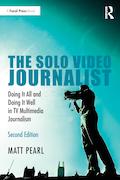Maybe you’ve seen it scroll across your Instagram feed. Maybe you’ve heard it on a YouTube clip. But more than likely, if you’re in a field that involves creativity and craft – and journalism is absolutely such a field – you’ve become familiar with Ira Glass’ famous quote about the “taste gap.”
“For the first couple of years you make stuff,” Glass once said, “what you’re making isn’t so good. It’s trying to be good. It has ambition to be good. But it’s not quite that good. … A lot of people never get past that phase. … They quit. … It’s totally normal, and the most important possible thing you can do is do a lot of work – do a huge volume of work. … It’s gonna take you a while. It’s normal to take a while. And you just have to fight your way through that.”
It’s a critical message for creators, a light beam of faith from those who have clawed through the darkness. Keep working and creating, Glass tells us, and we’ll get to a place where our taste matches our ambition.
But I’m not sure if that place truly exists.
***
I’ve been doing this job long enough that I’ve reached a few guideposts of success. I’ve won awards, traveled for major assignments, and had stories that went viral and reached millions of eyes.
But rarely do I get every shot I need on a given shoot. Rarely do I edit a video without questioning at least a dozen decisions. Rarely do I feel fully confident on any given day.
I’d be lying if I said I’ve figured everything out.
I’d also be lying if I said I ever expect to.
From the start, journalists are pressured towards perfection. I went to a university whose J-school infamously handed out “Medill Fs” to any assignment that erred on a single fact. In many ways, this foundation is important. We should be expected to get names and statistics right, double-check our sources, and ensure that every fact we put on the air, in print, or online is accurate.
But there are other ways in which the perfection we portray is a myth. Particularly in TV news, we’re expected to dress with formality. We use “broadcast voices.” We use lofty descriptions of our product like “the news.” Our viewers do the same. If you’ve seen someone Tweet the phrase, “the media,” as a derogatory catch-all for an industry where apparently everyone operates with the same secret agenda, you’ve probably shaken your head or chuckled at the concept.
What we do is imperfect. General assignment reporters attempt to master a subject in a single shift, then master a new one the following day. Sometimes we don’t get to interview the best experts, just the best experts who have time that morning and agree to speak with us. We shoot, write, and interview with the subjectivity of our personal backgrounds and viewpoints. There is no way to do otherwise. When we tell the stories of others – which, in this field, is 99% of what we do – we can never fully put ourselves in their places. We can never understand the entirety of their paths. We try to distill their lived-in experiences to a few minutes or less, a wholly unfair task that’s impossible to fully get right.
I often feel we’d all be a whole lot better off – as individual journalists and as an industry – if we acknowledged these imperfections more often, privately and publicly. I’m as demanding of myself as anyone. I spend extended time on the phone with my stories’ subjects before I shoot a frame, because those conversations bring a more thorough understanding of their views. I show my work to colleagues, challenge my conventions, and try to surround myself with talented, thoughtful peers who will push me as hard as I push myself. But I still gnash my teeth after missing a key shot. I still scramble to meet deadlines and sometimes make mistakes. I still look at stories from years – even months – earlier and witness how my thoughts and beliefs have evolved.
And that’s OK.
***
There’s a different quote from a different creator that doesn’t spread through social media like the “taste gap.” It’s from Anthony Doerr, a fiction writer who won the Pulitzer Prize for his novel All The Light We Cannot See. (His one book of nonfiction, Four Seasons in Rome, is one of the most meaningful looks at parenthood, travel, and history I’ve ever read.) Doerr spoke at a writers’ conference in Arizona about pursuing perfection with each adjective, verb, and noun – and finding, at a certain point, futility in the pursuit.
“Can the word ‘tree’ do any more than approximate the great, shivering, growing, clattering, blooming, steadfast thing that is a tree?” Doerr says. “Can the word ‘marriage’ ever come remotely close to suggesting the fortifying, confusing, exhilarating journey that is a marriage? … You can never control all the outcomes of any sentence you write. The best you can do is make the thing as carefully as you can and, then, just let go.”
That’s the message. We should absolutely strive for perfection. But we must also acknowledge that we’ll never achieve it. Journalists are not perfect because no one is perfect. That shouldn’t dissuade us. We must continue to put in the work. We must swallow our failures and learn from them but be undeterred by them. We must refuse to stand still with what we think we know: about storytelling, about our subjects, about the world around us. We must evolve, because all else will.
That’s the common message from Glass and Doerr: Do the work. And keep moving forward.
The Solo Video Journalist is available for purchase. You can find it on Amazon, Barnes & Noble, and the publisher’s web site.
Matt Pearl is the author of the Telling the Story blog and podcast. Feel free to comment below or e-mail Matt at matt@tellingthestoryblog.com. You can also follow Matt on Facebook and Twitter.

